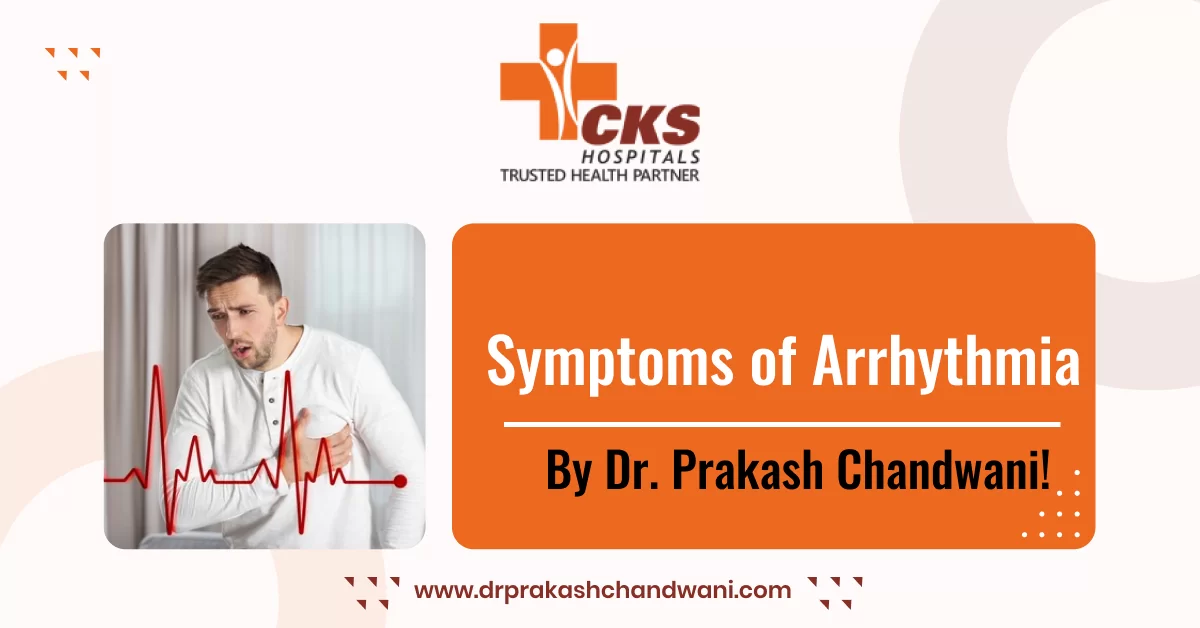
Symptoms of Arrhythmia By Dr. Prakash Chandwani
Symptoms of Arrhythmia: Arrhythmia is any change from the typical sequence of electrical impulses in the heart. It makes the heart beat too fast, too slowly, or not at all. Atria, the upper chambers of the heart, or ventricles, the bottom chambers, can have arrhythmias. There are various types of arrhythmias, ranging from benign to life-threatening. In this blog, we will describe about Symptoms of Arrhythmia by Dr. Prakash Chandwani (The best Cardiologist in Jaipur).
What is Arrhythmia?
Arrhythmia occurs when the electrical impulses that coordinate heartbeats don’t work properly, causing the heart to beat too fast, slow, or irregularly. A healthy heart beats between 60 and 100 times per minute when it is at rest. This well-organized electrical action is thrown off by arrhythmia.
Some arrhythmias are harmless, but others can indicate a serious underlying condition. Arrhythmias may start in the heart’s upper chambers (atria) or lower chambers (ventricles). Depending on which part of the heart is affected, arrhythmias are categorized into bradycardia, tachycardia, premature contraction, etc.
Signs and Symptoms of Arrhythmia
Some common signs and symptoms of arrhythmia include:
Fluttering in the Chest
A sensation of rapid or irregular heartbeat can be felt in the chest. Could feel like heart palpitations, skipped beats, or a heart beating fast..
Tachycardia
Abnormally rapid heart rate that exceeds 100 beats per minute. Causes symptoms like breathlessness, chest pain, and dizziness.
Bradycardia
A heart rate of less than 60 beats per minute is very dangerous. Can make you tired, pass out, or become confused.
Irregular Heartbeat
There are breaks between beats in the beating rate. The heart can beat too fast or too slow.
Palpitations
Feeling like your heart is beating fast, fluttering, or smashing. Possibly last for hours or just seconds.
Lightheadedness
An experience characterized by dizziness, instability, or a lack of equilibrium. As a result of diminished cerebral blood circulation.
Shortness of Breath
Difficulty breathing or getting winded easily. Due to the heart’s inability to pump sufficient oxygenated blood.
Chest Pain
Discomfort or tightness felt in the chest due to inadequate blood supply to heart muscles.
Fatigue
Experiencing fatigue and debilitation as a result of insufficient oxygen supply and accumulation of metabolic waste.
Fainting (Syncope)
Syncope is a transient loss of consciousness resulting from reduced cerebral blood flow.
Diagnosis
For diagnosing arrhythmia, Dr Prakash Chandwani, a well-known Cardiologist in Jaipur, does a physical examination and takes the medical history. He might check the pulse and blood pressure and listen to the heart using a stethoscope.
Some of the diagnostic tests to be used in the diagnosis of arrhythmias are the following:
- Electrocardiogram (ECG)
- Holter monitor
- Event recorder
- Echocardiogram
- Electrophysiology study
- Tilt table test
- Blood tests
- Stress test
Risk Factors
Certain factors increase the risk of developing arrhythmias:
- Heart disease
- High blood pressure
- Diabetes
- Thyroid problems
- Smoking
- Excessive alcohol use
- Caffeine, stimulants
- Electrolyte imbalances
- Older age
- Family history of arrhythmias
- Stress
- Sleep apnea
In summary, arrhythmias have many types based on where they occur in the heart and how they affect heart rate or rhythm. While some arrhythmias are harmless, others can indicate underlying heart disease. Diagnosis is done using ECG, Holter monitor, and other tests. Treatments like medications, cardioversion, ablation procedures, and pacemakers can help manage arrhythmias. Controlling risk factors can help prevent arrhythmias.
FAQs: Symptoms of Arrhythmia
1: How long has Dr Chandwani been practicing cardiology?
Dr. Chandwani has over 20 years of experience as a Cardiologist in Jaipur.
2: What tests diagnose arrhythmias?
ECG, Holter monitoring, and echocardiograms help diagnose arrhythmias by recording heart rhythms.
3. Can you exercise with an irregular heartbeat?
Light exercise may be okay but check with your doctor first about safe activities.
4. Why do patients trust Dr Chandwani?
His compassion, precise diagnosis, modern treatments, and dedication to optimal outcomes make him a trusted cardiologist.
Also Read

